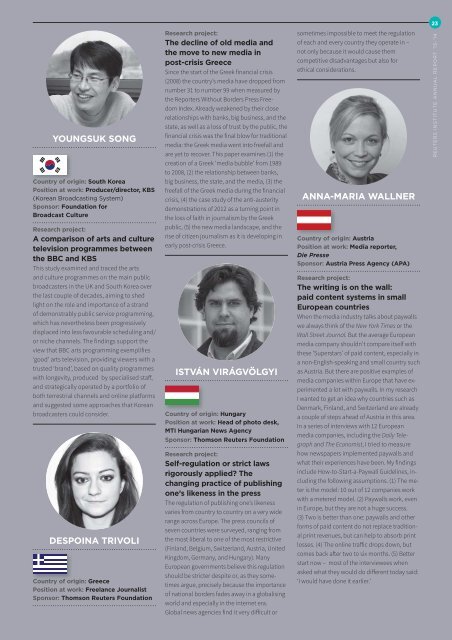7rcJ7W
7rcJ7W
7rcJ7W
You also want an ePaper? Increase the reach of your titles
YUMPU automatically turns print PDFs into web optimized ePapers that Google loves.
23<br />
YOUNGSUK SONG<br />
Country of origin: South Korea<br />
Position at work: Producer/director, KBS<br />
(Korean Broadcasting System)<br />
Sponsor: Foundation for<br />
Broadcast Culture<br />
Research project:<br />
A comparison of arts and culture<br />
television programmes between<br />
the BBC and KBS<br />
This study examined and traced the arts<br />
and culture programmes on the main public<br />
broadcasters in the UK and South Korea over<br />
the last couple of decades, aiming to shed<br />
light on the role and importance of a strand<br />
of demonstrably public service programming,<br />
which has nevertheless been progressively<br />
displaced into less favourable scheduling and/<br />
or niche channels. The findings support the<br />
view that BBC arts programming exemplifies<br />
‘good’ arts television, providing viewers with a<br />
trusted ‘brand’, based on quality programmes<br />
with longevity, produced by specialised staff,<br />
and strategically operated by a portfolio of<br />
both terrestrial channels and online platforms<br />
and suggested some approaches that Korean<br />
broadcasters could consider.<br />
DESPOINA TRIVOLI<br />
Country of origin: Greece<br />
Position at work: Freelance Journalist<br />
Sponsor: Thomson Reuters Foundation<br />
Research project:<br />
The decline of old media and<br />
the move to new media in<br />
post-crisis Greece<br />
Since the start of the Greek financial crisis<br />
(2008) the country’s media have dropped from<br />
number 31 to number 99 when measured by<br />
the Reporters Without Borders Press Freedom<br />
Index. Already weakened by their close<br />
relationships with banks, big business, and the<br />
state, as well as a loss of trust by the public, the<br />
financial crisis was the final blow for traditional<br />
media: the Greek media went into freefall and<br />
are yet to recover. This paper examines (1) the<br />
creation of a Greek ‘media bubble’ from 1989<br />
to 2008, (2) the relationship between banks,<br />
big business, the state, and the media, (3) the<br />
freefall of the Greek media during the financial<br />
crisis, (4) the case study of the anti-austerity<br />
demonstrations of 2012 as a turning point in<br />
the loss of faith in journalism by the Greek<br />
public, (5) the new media landscape, and the<br />
rise of citizen journalism as it is developing in<br />
early post-crisis Greece.<br />
ISTVÁN VIRÁGVÖLGYI<br />
Country of origin: Hungary<br />
Position at work: Head of photo desk,<br />
MTI Hungarian News Agency<br />
Sponsor: Thomson Reuters Foundation<br />
Research project:<br />
Self-regulation or strict laws<br />
rigorously applied The<br />
changing practice of publishing<br />
one’s likeness in the press<br />
The regulation of publishing one’s likeness<br />
varies from country to country on a very wide<br />
range across Europe. The press councils of<br />
seven countries were surveyed, ranging from<br />
the most liberal to one of the most restrictive<br />
(Finland, Belgium, Switzerland, Austria, United<br />
Kingdom, Germany, and Hungary). Many<br />
European governments believe this regulation<br />
should be stricter despite or, as they sometimes<br />
argue, precisely because the importance<br />
of national borders fades away in a globalising<br />
world and especially in the internet era.<br />
Global news agencies find it very difficult or<br />
sometimes impossible to meet the regulation<br />
of each and every country they operate in –<br />
not only because it would cause them<br />
competitive disadvantages but also for<br />
ethical considerations.<br />
ANNA-MARIA WALLNER<br />
Country of origin: Austria<br />
Position at work: Media reporter,<br />
Die Presse<br />
Sponsor: Austria Press Agency (APA)<br />
Research project:<br />
The writing is on the wall:<br />
paid content systems in small<br />
European countries<br />
When the media industry talks about paywalls<br />
we always think of the New York Times or the<br />
Wall Street Journal. But the average European<br />
media company shouldn’t compare itself with<br />
these ‘Superstars’ of paid content, especially in<br />
a non-English-speaking and small country such<br />
as Austria. But there are positive examples of<br />
media companies within Europe that have experimented<br />
a lot with paywalls. In my research<br />
I wanted to get an idea why countries such as<br />
Denmark, Finland, and Switzerland are already<br />
a couple of steps ahead of Austria in this area.<br />
In a series of interviews with 12 European<br />
media companies, including the Daily Telegraph<br />
and The Economist, I tried to measure<br />
how newspapers implemented paywalls and<br />
what their experiences have been. My findings<br />
include How-to-Start-a-Paywall Guidelines, including<br />
the following assumptions. (1) The meter<br />
is the model: 10 out of 12 companies work<br />
with a metered model. (2) Paywalls work, even<br />
in Europe, but they are not a huge success.<br />
(3) Two is better than one: paywalls and other<br />
forms of paid content do not replace traditional<br />
print revenues, but can help to absorb print<br />
losses. (4) The online traffic drops down, but<br />
comes back after two to six months. (5) Better<br />
start now – most of the interviewees when<br />
asked what they would do different today said:<br />
‘I would have done it earlier.’<br />
REUTERS INSTITUTE ANNUAL REPORT ’13-’14


